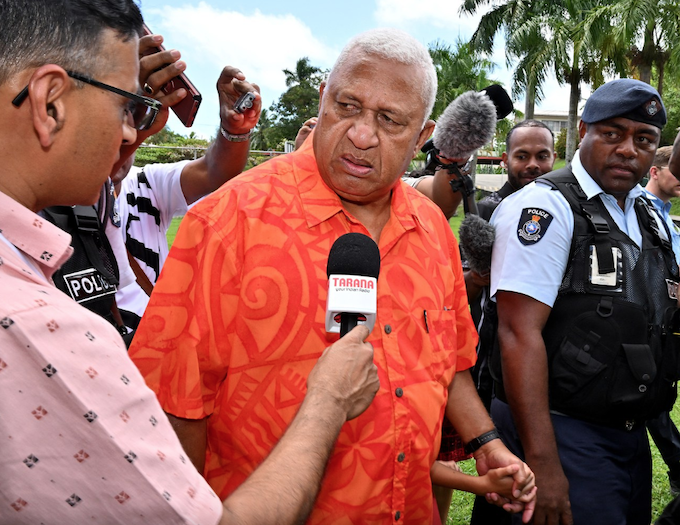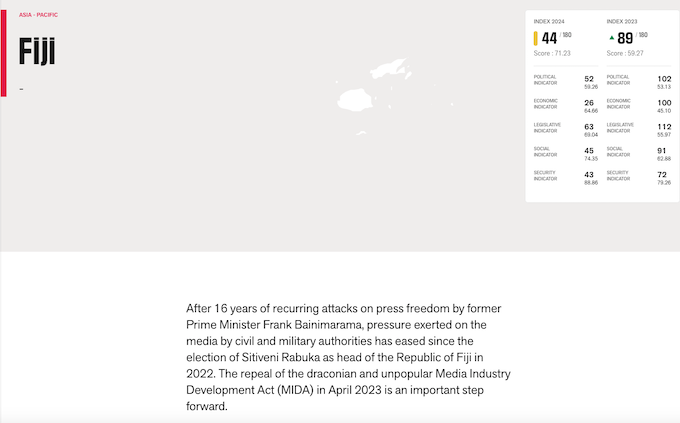
By Stephen Wright and Stefan Armbruster of BenarNews
Fiji’s ranking in a global press freedom index has jumped into the top tier of countries with free or mostly free media after its government last year repealed a draconian law that threatened journalists with prison for doing their jobs.
Fiji’s improvement in the annual Reporters Without Borders World Press Freedom Index was in contrast to the global trend for erosion of media independence — manifested in the Pacific by Papua New Guinea’s evolving plans for a media law and its prime minister’s threat to retaliate against journalists.
The Paris-based advocacy group, also known as Reporters sans frontières (RSF), said yesterday — World Press Freedom Day — there had been a “worrying decline” globally in respect for media autonomy and an increase in pressure from states and other political actors.
- READ MORE: NZ slumps to 19th as RSF says press freedom threatened by global decline
- The full 2024 RSF World Press Freedom Index
- Silencing the messenger: Israel kills journalists while the West merely censors them – David Robie
- RSF calls on NZ Prime Minister to reaffirm his government’s commitment to press freedom
- Timor-Leste makes top ten in 2023 World Press Freedom Index
“States and other political forces are playing a decreasing role in protecting press freedom. This disempowerment sometimes goes hand in hand with more hostile actions that undermine the role of journalists,” said RSF’s editorial director Anne Bocandé.
The international community, RSF said, also has shown a “clear lack of political will” to enforce principles of protection of journalists.
At least 22 Palestinian journalists — 143 journalists in total, according to Al Jazeera — have been killed in the course of their work by Israel’s military during its war in Gaza since October, it said.
Meanwhile authoritarian governments in Asia, the most populous continent, are “throttling journalism,” the group said, citing the examples of Vietnam, Myanmar, China, North Korea and Afghanistan.
Only four Pacific countries in Index
The index covers 180 countries but it reports on only four of two dozen Pacific island nations and territories.
Excluded Pacific island countries include those with no independent media, such as Nauru, and others with a diversity of media organizations such as Vanuatu and the Solomon Islands.
RSF told BenarNews that while it currently does not have the capacity, it hopes to increase the number of Pacific island countries it reports on and to forge relationships with more Pacific media organizations.
The chief executive of Vanuatu Broadcasting & Television Corporation [VBTC], Francis Herman, said he would welcome Vanuatu’s inclusion.
“I think it is important that Vanuatu is included. There are challenges around media freedom, the track record in the past is of threats to media freedom,” he told BenarNews at a Pacific broadcasters conference in Brisbane.
“We are relatively free but that doesn’t mean everything is all well.”

Fiji’s position in the index improved to 44th in 2024 from 89th the previous year, reflecting the seachange for its media after strongman leader Voreqe Bainimarama lost power in a 2022 election.
Fiji’s attacks in press freedom
“After 16 years of repeated attacks on press freedom under Frank Bainimarama, pressure on the media has eased since Sitiveni Rabuka replaced him as prime minister in 2022,” said RSF.

Fiji Broadcasting Corporation said the reform had allowed its journalists to do stories they previously shied away from.
“Self-censorship out of fear for the possible consequences was the biggest issue in holding power to account,” FBC said in a statement provided to BenarNews on behalf of its newsroom.
“The 16 years under the media decree meant many experienced journalists left the profession and a generation of journalists couldn’t practice in a free and transparent media environment.
“Already we’re seeing positive change but it’s going to take some time to rebuild the skills and confidence to report without fear or favor.”
The win for press freedom in the Pacific comes at a time when China’s government, ranked at 172nd on the index and which tolerates media only as a compliant mouthpiece, is vying against the United States, ranked at 55th, for influence in the region.
State-controlled or influenced media has a prominent role in many Pacific island countries, partly due to small populations, economies of scale and cultural norms that emphasize deference to authority and tradition.
Small town populations
Nations such as Tuvalu and Nauru only have populations of a small town.

The press freedom ranking of Papua New Guinea, the most populous Pacific island country, deteriorated to 91st place from 59th last year.
The government last year said it planned to regulate news organisations and released a draft media policy that envisaged newsrooms as tools to support the economically-struggling country’s development objectives.
Prime Minister James Marape has frequently criticised Papua New Guinea’s media for reporting on the country’s problems such as tribal conflicts. He has said that journalists were creating a bad perception of his government and he would look to hold them accountable.
Belinda Kora, secretary of the PNG Media Council, said the proposed media development law is now in its fifth draft, but concerns about it representing a threat to a free press have not been allayed.
“The newsrooms that we’ve been able to talk to, especially the members of the council, all 16 of them, are unhappy,” she told BenarNews at a Pacific broadcasters’ conference in Brisbane.
They see “there are some clauses and some pointers in this policy that point to restricting media, to lifting the cost of licenses for broadcasting organisations,” she said.
RSF commended Samoa ranked 22nd as a regional leader in press freedom. The Polynesian country is the only Pacific island nation in the top 25 for the second year running, and Tonga is 45th.
Copyright ©2015-2024, BenarNews. Used with the permission of BenarNews.













































